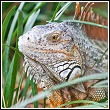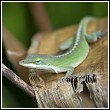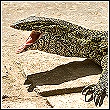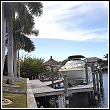Florida Lizards
Lizard Control
Much of the lizard control methods in Florida involve exclusion to keep lizards out of your home and off your property. Many nuisance lizards in Florida can be trapped and removed as long as it is done within state guidelines. Of course, it is always best to call a professional, because many of the lizards can be hazardous to handle.
Hazardous & Invasive Lizards
Iguanas, Nile monitors and tegus all have sharp teeth, hazardous claws and powerful tails that pack quite a wollup.
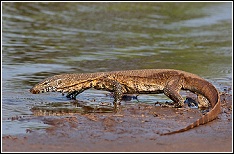
There are not any known "venomous" lizards in Florida at this time, at least according to the definition of what "venomous" actually means, however, some of the state's nuisance lizards do have a toxic saliva that can be transmitted via bites and handling. Their toxic saliva can make you very sick, for instance, if you are bitten by a Nile monitor you are advised to seek medical help immediately.
There are some smaller lizards and geckos that may look harmless when in fact they are not. The tokay gecko like the one shown in the photo below looks cute and has an almost comical appearance, however, a tokay gecko has teeth, will bite and won't let go. If a tokay gecko grabs a hold of you, just about the only way to make it let go is to hold it under water. In short, you do not want to mess with the wrong lizard.
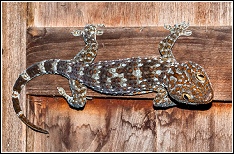
Nuisance lizards thrive in Florida's warm sun, like to take advantage of the areas plentiful food supply, and hide in its lush vegetation.
A non-native lizard population can increase at an alarming rate under those circumstances, particularly when the population controls that kept the animal under control in its native homeland are no longer available to keep them in check here. The numbers have increased so rapidly as a matter of fact, that in many cases wildlife control professionals have given up on trying to eradicate them from the area (there are just too many) and have switched to looking for ways to control them instead.
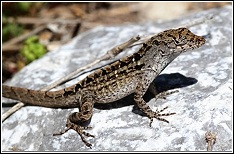
Several species come to mind including the Nile monitor, green iguana, black spiny tailed iguana and brown anole (see photo above).
Lizard Removal
It is legal to trap and remove most of the non-native lizards in Florida, however, they are protected by Florida's anti-cruelty laws and those guidelines must be followed. Most of the non-native lizards of Florida could be viewed as "invasive" and relocation is not allowed.
When getting rid of iguanas or any other lizards in Florida the set guidelines must be followed or you will be in violation of the law. This in itself, is a good reason to turn to a professional for help - one that knows and understand the legal guidelines within which they must work.
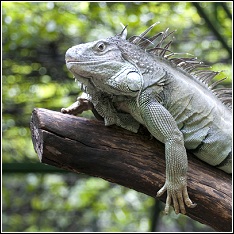
Getting rid of iguanas and lizards via trapping will often solve the problem temporarily, however, more will quickly move in to take their place and the removal process, will have to start all over again. It is better to proof your property and discourage lizards from coming around in the first place, so before you have a problem, or right after you have removed one we always recommend taking preventative steps.
The Wildlife Whisper can help you with home modifications, proofing lanais and other steps toward lizard exclusion. Keeping lizards out is something we love to do. We can help you remove your lizards, but more importantly, we can keep them from coming back.
How To Keep Lizards Away
Most lizards aren't necessarily as hazardous as some of the larger ones mentioned above, however, even a common house gecko can become annoying, particularly when they start invading your home or lanai.
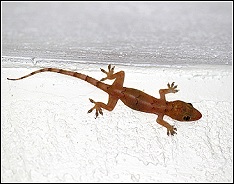
When you want to get rid of lizards, geckos and iguanas, the best strategy is a comprehensive one, and we can help you through each step along the way. We can identify and remove the lizard causing the problem, make the necessary modifications to prevent future issues, and even make landscaping suggestions. Taking away a lizard's shelter and food source is a great way to encourage them to move on, and the most humane way to practice lizard control around your home and property.
Please visit our sections below to learn more.
1242 SW Pine Island Rd., Suite 310
Cape Coral, Florida 33991-2126
help@totalwildlifecontrol.com



